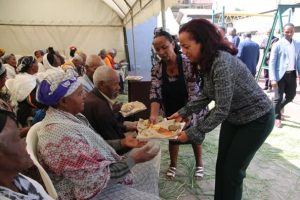
It is well recognized that effective communication and social interaction are crucial for driving positive change, enabling communities to address issues, build consensus and implement solutions through participatory proceedings.
Cognizant of this fact, The Ethiopian Herald had a stay with Bethlehem Hunegnaw, a communication expert graduated from Addis Ababa University in Journalism and Communication, to have a piece of information about communication and its significance in boosting interpersonal and communal connections.
She said, “Effective social interaction is essential to everyday life, especially in educational environment, workplace scenarios and interactional relationships. Individuals with good speaking skills tend to express their thoughts and ideas clearly and coherently, which fosters effective communication in various social situations. In addition, good speaking skills affect peoples’ ability to listen well and understand others’ perspectives.”
With good communication skills, individuals can avoid misunderstandings and increase compassion for others, which in turn will strengthen healthy and sounding social contacts across all environments of societal interaction.
As to Bethlehem, social interaction at workplaces, schools, public gathering set-ups and other related settings can be enhanced by improving speaking skills. By fostering effective communication, we can create an inclusive environment and contribute positively to community/society experiences.
“The existence of communication in social interaction can lead to more effective connections, of course. However, the weak communication skills reflected by some are related to their ability to express/utter ideas. The ability to speak, communicate with others/friends, and share ideas or opinions can be duly recognized among the community,” she underlined.
As human beings are essentially social beings who are dependent on one another, social interaction is a process that a person goes through it, establishing reciprocal relationships, individuals with individuals, individuals with groups, and groups with groups. The most important things that need to be considered in everyday life when communicating are to speak properly and correctly to precisely convey the intended message, she opined.
By connecting with others in a context of shared interests, everyone stands to gain because people expand knowledge and experience through social interaction. Communicating with friends, workers, and/or employees is always going to present challenges since the presence of misunderstandings and miscommunications is quite inevitable, she underlined.
“However, building and mastering effective communication skills will make engagements easier, even during difficult conversations. Taking time to build these skills will certainly be of paramount importance in making communication aspects presumably smooth.”
According to Bethlehem, when people engage in social activities among the society, in schools and other related gatherings, all categories of participants would, no doubt, have the opportunity to observe how other people act in these situations.
“In everyone’s busy life, it’s not always easy to be aware of these thoughts, especially habitual thoughts that sometimes lurk behind others. However, if people make a point to listen to others’ thoughts, they may discover some that they would like to change. Once one began to recognize thoughts, they would like to change; they can train themselves in new directions and become ready to turn a negative thought into a constructive one.”
As to her, in the course of exercising communication and interpersonal contact, acknowledging that everyone is unique is the most important approach to helping boost the essence of communication.
She further elucidated that in due course of fostering communication; using welcoming body language is also important. If one is at a social gathering, they have to be well aware of their body language as showing a range of gestures would be interpreted into many dimensions and given meanings apart from grabbing audiences’ attentions towards the gesticulation.
She said that from such deviated signs, one can easily deduce that communication, non-verbally of course, especially in well-organized and formal scenarios, needs to be handled well and carefully framed, but not in a position to give a hard time to the presenter or communicator.
According to Bethlehem, keeping conversations balanced is also one of the most preferable and effective means to have a fruitful deliberation.
Yes, she said in the era of complex and quickly evolving occupational environments, with hundreds of different communication tools, fully or partially remote teams, and even multicultural teams spanning multiple time zones, effective communication has never been more challenging.
For instance, a leader’s ability to communicate clearly and effectively with employees, within teams, and across the organization is one of the foundations of a successful industry. Thus, the ability to communicate might be a manager’s most critical skill. The good news is that these skills can be learned and even mastered as there are a number of ways which can help people maximize their communication skills for the success of their organization and their career.
She stated that communication is primarily about word choice. And when it comes to word choice, less is more. The key to powerful and persuasive communication — whether written or spoken — is clarity and, when possible, brevity. Before one would like to engage in any form of communication, they have to define their goals and comprehend their respective audiences.
She said, “Outlining carefully and explicitly what we want to convey and why, will help ensure that we include all necessary information. It will also help us eliminate irrelevant details. Besides, avoid unnecessary words and overly flowery language, which can distract from our message, is equally weighed. Plus to this, while repetition may be necessary in some cases, we have to be sure to use it carefully and sparingly. Though repeating our message can ensure that our audiences receive it, but too much repetition can cause them to tune us out entirely.”
“Hence, we have to know what we are going to say and how we are going to say it before we begin any type of communication. However, being prepared means more than just practicing a presentation. Preparation also involves thinking about the entirety of the communication, from start to finish.”
As to Bethlehem, another means for fueling a successful communication is, one has to brainstorm potential questions, requests for additional information or clarification before entering into any conversation.
Since conflicting verbal and nonverbal communication can confuse the normal course of action of communication, a communicator/presenter/talker/ needs to take all elements that potentially hinder the smooth flow of communication into consideration, she added.
In general, it is possible to enhance one’s communication skills by practicing and/or participating in podiums targeting at idea explanation, interaction and partaking in a range of scenarios that can back good communication features. Undeniably, one has to participate in livable circumstances so as to build capacity towards influencing and motivating others, building trust and alliances across any organization. Thus, effective communication ultimately helps people improve their ability to converse as effective correspondents. In so doing, coming up with a telling social interaction through communication would be made a reality.
BY MENGESHA AMARE
THE ETHIOPIAN HERALD FRIDAY 4 APRIL 2025





